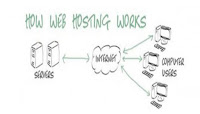Web hosting is the foundation of any successful
website. Without a reliable hosting provider, your website may experience
downtime, slow loading times, and security vulnerabilities. Choosing the right
web hosting provider can make all the difference, but with so many options
available, it can be overwhelming to know where to start.
In this blog post, I'll cover everything you need
to know about web hosting, including the different types of hosting available,
the features to look for, and how to choose the best provider for your website.
Whether you're starting a new website or looking to switch web hosting
providers, this guide will provide you with the information you need to make an
informed decision.
Part 1: Understanding Web Hosting
Let's start with the basics. What is web hosting?
Simply put, web hosting is the service that allows you to publish your website
on the internet. When you create a website, all the files and data that make up
your site need to be stored somewhere. That's where a web hosting provider
comes in. They provide you with server space to store your website files and make
your site accessible to anyone who visits it.
When someone visits your website, their computer sends a request to the server where your website files are stored. The server then sends those files back to the user's computer, displaying your website on their screen.
When you sign up for a web hosting plan, your provider assigns you a space on their servers to store your website files. These files are then served to visitors when they type in your website's URL. The hosting provider is responsible for maintaining the server, ensuring that it's secure, and providing support to their customers.
There are several different types of web hosting
available, each with its own advantages and disadvantages. Let's take a closer
look at some of the most common types of web hosting.
Part 2: Types of Web Hosting
Now that we have that out of the way, let's talk
about the different types of web hosting. There are four main types of web
hosting: shared hosting, VPS hosting, dedicated hosting, and cloud hosting.
Each type has its own advantages and disadvantages, so let's break it down.
2.1. Shared
Hosting
Shared hosting is the most common type of web hosting and is typically the most affordable option. With shared hosting, your website shares server resources with other websites hosted on the same server. This makes it a cost-effective option for small businesses and personal websites.
The downside of shared hosting is that if another
website on the same server experiences a surge in traffic, it can slow down
your website's performance. Additionally, shared hosting plans typically have
limitations on the amount of storage, bandwidth, and other resources available.
2.2. VPS
Hosting
This means that you have more control over your
hosting environment and the performance of your website is less likely to be
affected by other sites on the server. VPS hosting is a good option for small
to medium-sized businesses that require more resources and control over their
hosting environment.
2.3. Dedicated
Hosting
With dedicated hosting, your website is hosted on a dedicated server that is solely dedicated to your site. This means that you have complete control over your hosting environment and the performance of your website is not affected by other sites.
Dedicated hosting is ideal for large businesses or
websites with high traffic that require a lot of resources. However, it's also
the most expensive type of hosting, and it requires technical expertise to
manage.
2.4. Cloud
Hosting
Cloud hosting is a newer type of hosting that offers scalability and flexibility. With cloud hosting, your website is hosted on a network of servers, which means that resources are pulled from multiple servers to ensure optimal performance.
Cloud hosting is ideal for websites with high
traffic or unpredictable traffic patterns. It's also scalable, which means that
you can easily upgrade or downgrade your hosting plan based on your website's
needs.
Part 3: Features to
Look for in a Web Hosting Provider
Choosing the right web hosting provider can be a
daunting task, but there are a few key features that you should look for when
selecting a provider:
3.1. Reliability
and Uptime Guarantee
One of the most important factors to consider when choosing a web hosting provider is reliability. Uptime refers to the amount of time your website is available and accessible to users. Look for a provider that offers an uptime guarantee of at least 99.9%. This ensures that your website will be accessible to visitors at all times.
3.2. Security
Features
Website security is another critical factor to consider. Look for a provider that offers advanced security features such as SSL certificates, firewalls, malware scanning, and DDoS protection. This will help protect your website and your users' data from cyber threats.
3.3. Customer
Support
Good customer support is essential when it comes to web hosting. Look for a web hosting provider that offers 24/7 customer support, ideally through multiple channels such as phone, email, and live chat. This will ensure that you can quickly resolve any issues that arise with your website. It's also helpful to read reviews from other customers to get an idea of the provider's support quality.
3.4. Scalability
As your website grows, you may need more resources and a higher level of hosting. Choose a web hosting provider that offers scalable hosting plans, so you can easily upgrade your hosting as your website grows and your traffic increases.
3.5. Pricing
and Value
Price is, of course, an important factor to consider, but don't just choose the cheapest option. Look for a provider that offers good value for your money and includes the features you need in their plans.
Part 4: Web Hosting Features
In addition to the types of hosting, there are many
different features to consider when choosing a web hosting provider. Here are
some of the most common features to look for:
4.1. Control Panel:
A control panel is a web-based interface that allows you to manage your website, such as adding or removing files, creating email accounts, and managing databases.
4.2. Email Hosting:
Many web hosting providers offer email hosting, allowing you to create email accounts with your domain name, such as [email protected]
4.3. Backups:
Backups are essential to ensure you don't lose all your website data in the event of a server crash or cyber attack. Look for a web hosting provider that offers regular backups and easy restoration options.
4.4. Website Builder:
If you're new to website design, a website builder can be a great tool to help you create a professional-looking website with ease.
Part 5: How to Choose
the Best Web Hosting Provider?
Now that you understand the different types of
hosting available and the features to look for, it's time to choose a web
hosting provider. Here are some steps to help you make the best decision:
5.1. Determine
Your Hosting Needs
Before you start comparing hosting providers, it's important to determine your hosting needs. Consider factors such as your website's traffic, storage requirements, and technical requirements. This will help you choose a hosting plan that meets your needs.
5.2. Research
Hosting Providers
Do your research and compare hosting providers based on the features they offer, their pricing, and their reputation. Look for reviews and ratings from other customers to get an idea of their experience with the provider.
5.3. Consider
Your Budget
Hosting costs can add up quickly, so it's important to consider your budget when choosing a provider. Look for a provider that offers plans within your budget but don't sacrifice important features for a lower price.
5.4. Test
the Provider's Customer Support
Good customer support is essential when it comes to web hosting. Before choosing a provider, test their customer support by reaching out with a question or concern. This will give you an idea of their response time and the quality of their support.
5.5. Choose
a Provider and Sign Up
Full-Stack Web Development In 7 days
Here are some additional tips to help you make the best decision for your website:
5.6. Read
Reviews and Compare Providers
Before committing to a web hosting provider, read reviews from other users and compare different providers. This will give you an idea of the quality of their service and how they stack up against their competitors.
5.7. Consider
the Location of the Servers
The location of your web hosting provider's servers can affect the speed and performance of your website. Choose a provider with servers located close to your target audience for the best performance.
Full-Stack Web Development In 7 days
5.7. Check
the Terms of Service
Before signing up with a web hosting provider, make sure you understand their terms of service. Look for any hidden fees or restrictions that may affect your website or business.
Conclusion
In this blog post, I've covered the basics of web
hosting and the factors to consider when choosing a web hosting provider. I've
also gone over some common types of web hosting and how they differ.
Remember that choosing the right web hosting provider is an important decision that can have a significant impact on your website's success. Take the time to do your research, compare providers, and choose the one that meets your website's needs and budget.
I hope that this blog post has provided you with
the information you need to make an informed decision about web hosting. If you
have any questions or comments, feel free to leave them below.






































No comments:
Post a Comment